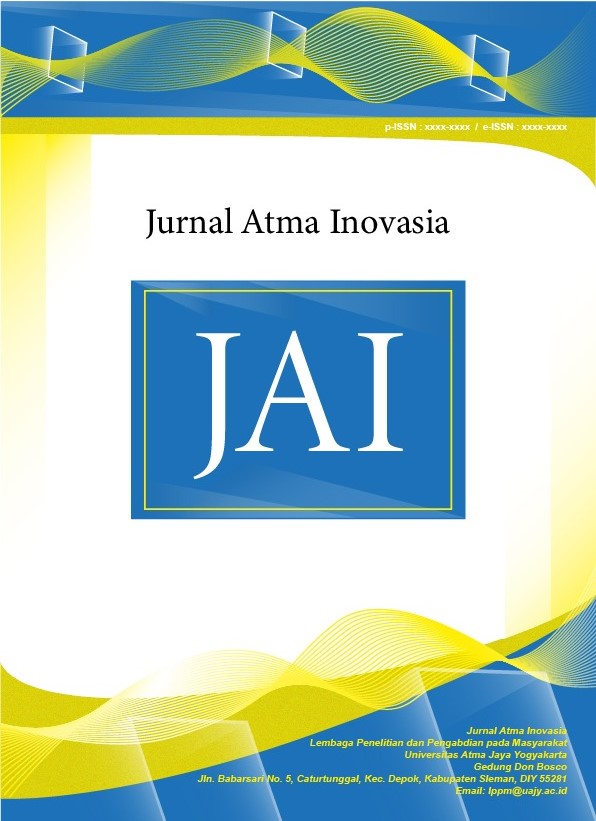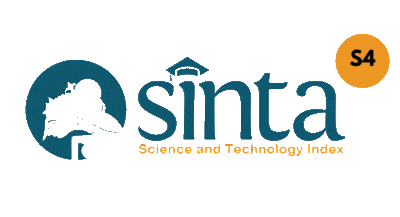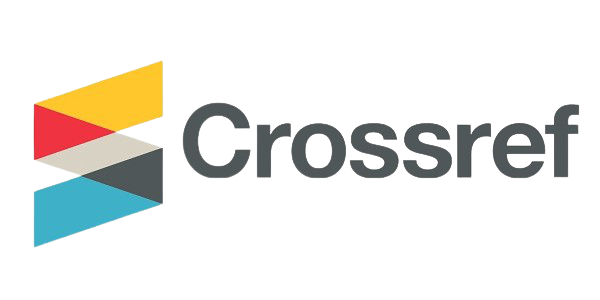Peningkatan Kompetensi Digital Guru melalui Pelatihan Pembuatan Website dengan Google Sites di SMA Ma'arif 1 Yogyakarta
DOI:
https://doi.org/10.24002/jai.v5i4.11332Keywords:
kompetensi digital, pelatihan guru, Google Sites, media pembelajaran, website pribadiAbstract
Perkembangan teknologi digital saat ini menuntut semua sektor, termasuk pendidikan, untuk beradaptasi dan memanfaatkannya dalam proses belajar mengajar. Salah satu bentuk pemanfaatan teknologi di lingkungan pendidikan adalah kemampuan guru dalam membangun identitas profesional melalui website pribadi yang juga dapat digunakan sebagai media pembelajaran. Kegiatan pengabdian masyarakat ini dilakukan di SMA Ma’arif 1 Yogyakarta dan bertujuan untuk memberikan pelatihan kepada para guru dalam membuat website pribadi menggunakan platform Google Sites. Materi pelatihan meliputi konsep pembelajaran digital, perencanaan konten, serta praktik langsung membuat dan menyusun struktur website. Selain menjadi sarana branding diri, website yang dibuat juga diharapkan mampu menjadi repositori materi pembelajaran yang dapat diakses oleh siswa kapan saja dan di mana saja. Peserta pelatihan terdiri dari guru berbagai mata pelajaran, dan sebagian besar belum memiliki pengalaman membuat website sebelumnya. Hasil kegiatan menunjukkan peningkatan pengetahuan dan keterampilan guru dalam mengelola konten digital, serta antusiasme yang tinggi dalam mengikuti pelatihan. Kegiatan ini diharapkan dapat menjadi langkah awal dalam mendorong transformasi digital di sekolah, khususnya dalam memperkuat peran guru sebagai fasilitator pembelajaran berbasis teknologi.
Kata Kunci—kompetensi digital, pelatihan guru, Google Sites, media pembelajaran, website pribadi
References
[1] T. Y. Salutina, G. P. Platunina, and I. A. Vasileva, “Transformation of Business Technologies into Digital Platforms and Evaluation of the Effectiveness of their Application,” in 2021 International Conference on Quality Management, Transport and Information Security, Information Technologies (IT&QM&IS), 2021, pp. 888–892. doi: 10.1109/ITQMIS53292.2021.9642870.
[2] X. Yanli and L. Danni, “Prospect of Vocational Education under the Background of Digital Age: Analysis of European Union’s ‘Digital Education Action Plan (2021-2027),’” in 2021 International Conference on Internet, Education and Information Technology (IEIT), 2021, pp. 164–167. doi: 10.1109/IEIT53597.2021.00042.
[3] W. Lu and H. Liang, “Research on Strategies and Measures for Enhancing Digital Literacy of College Teachers in the Era of Smart Education,” in 2024 IEEE First International Conference on Data Intelligence and Innovative Application (DIIA), 2024, pp. 1–3. doi: 10.1109/DIIA62678.2024.10871896.
[4] X. Xu, “The Sustainable Competency Oriented Computing Education for IT-Shape Elites and New Forms of Digital Education in the Future,” in 2024 36th International Conference on Software Engineering Education and Training (CSEE&T), 2024, pp. 1–2. doi: 10.1109/CSEET62301.2024.10663030.
[5] P. Zahariev, G. Hristov, N. Bencheva, D. Kinaneva, G. Georgiev, and I. Beloev, “Current Technologies, Present Challenges and Emerging Solutions for Digital Transformation of the Engineering Education,” in 2024 21st International Conference on Information Technology Based Higher Education and Training (ITHET), 2024, pp. 1–4. doi: 10.1109/ITHET61869.2024.10837672.
[6] V. A. Kastornova, O. A. Kozlov, I. S. Mukhametzianov, V. P. Poliakov, I. V. Robert, and T. S. Shikhnabieva, “International Experience of Digital Technologies Applying in Secondary Education Organizations Activities,” in 2022 2nd International Conference on Technology Enhanced Learning in Higher Education (TELE), 2022, pp. 248–253. doi: 10.1109/TELE55498.2022.9801027.
[7] L. Yang and D. Shao, “Research on Empowering Human Resource Management Teaching Reform and Innovation with Digital Technology,” in 2024 14th International Conference on Information Technology in Medicine and Education (ITME), 2024, pp. 1092–1096. doi: 10.1109/ITME63426.2024.00218.
[8] Y. Teng and F. Xie, “The deep integration of digital technology with teacher education and teaching within the TPACK framework in the digital intelligence era,” in 2024 14th International Conference on Information Technology in Medicine and Education (ITME), 2024, pp. 630–634. doi: 10.1109/ITME63426.2024.00129.
[9] Y. Ma, “Research on Digital Oil Painting Based on Digital Image Processing Technology,” in 2020 IEEE Conference on Telecommunications, Optics and Computer Science (TOCS), 2020, pp. 344–347. doi: 10.1109/TOCS50858.2020.9339719.
[10] E. Rahayu, E. Noersasongko, and S. D. Astuti, “Latest Technology and Going Digital in Entrepreneurial Business Models in the Digital Economy Era 2024,” in 2024 International Seminar on Application for Technology of Information and Communication (iSemantic), 2024, pp. 25–29. doi: 10.1109/iSemantic63362.2024.10762475.
[11] H. Lučkin, M. Škrbić, and E. Lučkin, “A proposed eGovernment Architecture based on Open Source components in Federation of Bosnia and Herzegovina,” in 2012 20th Telecommunications Forum (TELFOR), 2012, pp. 139–142. doi: 10.1109/TELFOR.2012.6419167.
[12] S. Van Staden and J. Mbale, “The Analogy of data within eGovernment Interoperable Ecosystem (AD-eGIE): Utilising sectorial information,” in 2011 IST-Africa Conference Proceedings, 2011, pp. 1–10.
[13] I. W. Ordiyasa, L. E. Nugroho, P. I. Santosa, R. Ferdiana, and W. Kumorotomo, “Interoperability model for eGoverment service based on adaptive ontology,” in 2015 International Conference on Data and Software Engineering (ICoDSE), 2015, pp. 138–144. doi: 10.1109/ICODSE.2015.7436986.
[14] C. Donghao, Z. Bohua, O. Chaomin, and C. Zhiyu, “Research on Military Internet of Things Technology Application in the Context of National Security,” in 2021 2nd International Conference on Electronics, Communications and Information Technology (CECIT), 2021, pp. 992–998. doi: 10.1109/CECIT53797.2021.00177.
[15] S. Ahmed, “The Digital and Cyberspace Modernization Strategy; A Possible Strategical Roadmap to Transform Traditional Military Organizations into a Smart Military through the Emerging Information Technology,” in 2022 International Conference on Computer and Applications (ICCA), 2022, pp. 1–8. doi: 10.1109/ICCA56443.2022.10039571.
[16] S. Li, Q. Yang, J. Xing, and S. Yuan, “Preliminary Study on the Application of Digital Twin in Military Engineering and Equipment,” in 2020 Chinese Automation Congress (CAC), 2020, pp. 7249–7255. doi: 10.1109/CAC51589.2020.9326911.
[17] A. F. Mendi, T. Erol, and D. Doğan, “Digital Twin in the Military Field,” IEEE Internet Comput, vol. 26, no. 5, pp. 33–40, 2022, doi: 10.1109/MIC.2021.3055153.
[18] L. Wu, W. Qi, W. Lin, and H. Cui, “Research on Service Process Optimization of Smart Power Business Hall Based on Ar And Digital Technology,” in 2024 Global Conference on Communications and Information Technologies (GCCIT), 2024, pp. 1–5. doi: 10.1109/GCCIT63234.2024.10862568.
[19] J. Wang and C. Lu, “Research on the Development and Practice of Digital Technology in Architectural Heritage,” in 2022 International Conference on Culture-Oriented Science and Technology (CoST), 2022, pp. 146–150. doi: 10.1109/CoST57098.2022.00039.
[20] W. Wang, “Research on Design and Innovation based on network platform and Digital Technology,” in 2020 International Conference on Innovation Design and Digital Technology (ICIDDT), 2020, pp. 401–404. doi: 10.1109/ICIDDT52279.2020.00080.
[21] J. J. Jarden, R. Ratnadewi, Y. Susanthi, A. D. Hangkawidjaja, R. A. Saragih, and D. Setiadikarunia, “Pelatihan Kecerdasan Buatan bagi Guru-guru TK dan SD Yayasan Agape Makedonia,” Jurnal Atma Inovasia, vol. 5, no. 2, pp. 141–146, 2025, [Online]. Available: https://ojs.uajy.ac.id/index.php/jai/article/view/10267
[22] Y. P. Wibisono and R. Perwiratama, “Menumbuhkan Literasi Web: Pelatihan WordPress di SMK Sanjaya Gunungkidul,” Jurnal Atma Inovasia (JAI), vol. 5, no. 1, p. 2025.
[23] N. Tri Suswanto Saptadi Fakultas Teknologi Informasi, U. Atma Jaya Makassar, and J. Tanjung Alang No, “Peningkatan Kompetensi Guru dalam Penciptaan Ruang Belajar Inklusif Berbasis Inovasi dan Kreativitas Teknologi di Era Digital,” Jurnal Atma Inovasia (JAI), vol. 5, no. 1, p. 2025, [Online]. Available: https://referensi.data.kemdikbud.go.id/berkebutuhan_khusus/
[24] P. L. T. Irawan and S. A. Rahmadianto, “Pemanfaatan Aplikasi Website Sebagai Instrumen Alternatif Pendorong Pertumbuhan Ekonomi Pertanian Kopi Warga,” J. Atma Inovasia, vol. 5, no. 2, pp. 136–140, 2025.
[25] P. T. Kecerdasan Buatan bagi Guru-guru dan SD Yayasan Agape Makedonia et al., “Pelatihan Kecerdasan Buatan bagi Guru-guru TK dan SD Yayasan Agape Makedonia,” Jurnal Atma Inovasia (JAI), vol. 5, no. 2, p. 2025.
Downloads
Published
Issue
Section
License
Copyright (c) 2025 Muhammad Resa Arif Yudianto, Tika Novita Sari, Nadhir Fachrul Rozam, Dzul Fadli Rahman, Masduki Zakarijah

This work is licensed under a Creative Commons Attribution-ShareAlike 4.0 International License.










